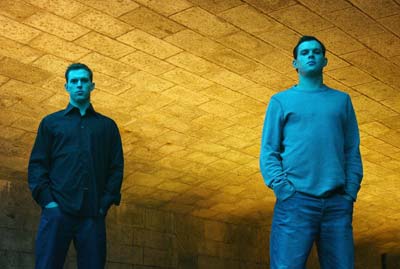'The best doubles pair in the world is John McEnroe and anyone else,' said Peter Fleming, when asked about the best combination ever in the game. He may have been right at that point of time, but things have changed now. The figures below make Fleming's assertion less convincing.
Six Grand Slam titles in 13 finals, 50 ATP Tour doubles titles (and counting), two Masters Cup crowns, 13 Masters Series wins, a Davis Cup trophy and an Olympic bronze medal to boot.
That, in a nutshell, are the credentials of the crack American doubles pair of Bob and Mike Bryan. Had Fleming played his tennis in this age, maybe, he would have said the best doubles pair in the world is a Bryan and anyone else.
The Bryan brothers have achieved a lot so far and still have a lot of tennis left in them. Maybe, there's still scope for Fleming to at least do a rethink.
Bob and Mike are doing their bit though. After a steady start, and a historic but unfortunate 2005 -- when they reached all four major finals but won only one, they were lethal in 2006 -- six titles in 10 finals -- and 2007 -- 11 titles of 15 finals. This year was a bit of a let down though, considering their high standards.
They lost in the ATP Masters Cup final in Shanghai, to Daniel Nestor and Nenad Zimonjic, and with it, surrendered the top spot they held so long. But, by then, they had done enough to ensure the year would still be a memorable one: five titles, including a second US Open.
In a candid conversation with Special Correspondent Bikash Mohapatra, the twins talk about life and times, and, of course, tennis. Excerpts.
Looking forward to your first visit to Chennai?
Yes, this will be our first visit to India and we are very excited to play at the Chennai Open. The tournament has become very popular on the Tour and we would like to use this opportunity to gain some valuable points in the build-up to the Australian Open.
We are told that Indians are very warm and hospitable. We are eagerly looking forward to this trip.
Tell us something about how you both started off?
Well, both of us had our first win at a doubles tournament at the age of six. It was an under-10 event. We had a great career in juniors. We won the 1996 US Open boys' doubles title, defeating Danielle Bracciali (Italy) and Jocelyn Robichaud (Canada) in the final. We also won the bronze medal at the 1999 Pan American Games at Winnipeg (Canada). It was the first time that we represented the United States as professionals.
During your junior years, you were forbidden to play each other by your parents. Why was that?
Yes, our parents thought that we would be defaulting to each other.
Tim and Tom Gullikson, Luke and Murphy Jensen and you seem to be carrying forward the trend. What is it that works for the Americans in this 'brothers-turned-partners-syndrome'?
Well, when you are playing with each other for such a long time you complement each other, motivate each other and help each other in playing better.
We know each other's strength and weaknesses, which helps us to play better during matches. It's good that since childhood we have been playing with each other
Any memories of the first match you won as a team on the ATP Tour?
Yes. It is one of the most memorable moments of our career and we still remember about that tournament. It was in 1998, at Atlanta, when we won over Trevor (Kronemann) and Dave (Randall). We both still talk about it whenever we feel low. That's the match which motivates us. Post that day we have got victories after victories and have never looked back
 What, according to you, was the turning point of your career?
What, according to you, was the turning point of your career?
I don't know if we can call it a turning point of our career but we always remember the USTA National Boys' under-18 Clay Court Championships. Maybe, it was the one.
We won that title again in 1996, becoming the first team in 30 years to repeat as doubles champions in that tournament.
You reached a record seven successive major finals in 2005-06. What do such records mean to you?
A record means a lot to us. Every match we play, we consider it to be of equal importance and our aim is to win and be focused in our game.
We motivate ourselves by winning tournaments and have great memories to take forward.
You have won six majors thus far but have also lost in seven other finals. How disappointing is it to lose in a major final?
It does bother us, because everyone likes to win. We do try to learn from our mistakes and try to convert the next game into a win.
Between your first major -- French Open 2003 -- and your second -- US Open 2005, there was almost a two-and-a-half-year gap. How frustrating was that wait; you were winning a lot of other titles but major successes eluded?
Well, yeah. But in 2005 we reached all four major finals. Though we lost in the Australian Open (to Kevin Ullyet-Wayne Black), French (to Jonas Bjorkman-Max Mirnyi) and Wimbledon (to Stephen Huss-Wesley Moodie), we won the second Grand Slam of our career at the US Open (beating Bjorkman-Mirnyi) in front of our home fans.
You missed out on the Olympic gold this year Isn't that the only major thing left for you to achieve?
Well, as we said, every tournament is important for us. Hope we convert every match into a win.
After more than a decade on the Tour, how would you assess yourselves as individuals and as a team?
Well, as a team, we must say we are 10-on-10. We are the best as a team.






